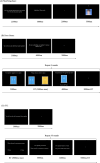Cognitive-behavioral therapy to normalize social learning for patients with major depressive disorders: study protocol for a single-arm clinical trial
- PMID: 40302007
- PMCID: PMC12042326
- DOI: 10.1186/s40359-025-02759-0
Cognitive-behavioral therapy to normalize social learning for patients with major depressive disorders: study protocol for a single-arm clinical trial
Abstract
Background: The current study aims to explore the efficacy of cognitive behavioral therapy (CBT) in normalizing social learning capabilities and its underlying neural processes among patients with MDD, in terms of enhancing learning towards positive social feedback, and reducing excessive learning towards negative social feedback. This study also explores the potential for learning impairments in social contexts as a biomarker to predict the effectiveness of CBT.
Methods: In a single-centre, single-arm, open-label trial, 60 outpatients with MDD will undergo 12 sessions of CBT in three months. Data collection of patients will be administered at baseline and at the endpoint of the treatment. Additionally, 60 heathy controls will be recruited as a comparative group to assess deviations from the normal functions in the patients with MDD before and after CBT. Data collection of the HC group will be administered at baseline. Data collection of the two groups comprises of demographic information, clinical assessments, psychological assessments, and behavioral experiments (i.e. the Door Game and the Trust Game) in conjuction with task-based function magnetic resonance imaging (fMRI) scanning. Data analysis comprises of an estimation of social learning capabilities by computational modeling, and identification of baseline abnormalities, treatment effects and endpoint abnormalities on social learning capabilities and its neural activities.
Discussion: This trial aims to assess the efficacy of CBT in normalizing social learning capabilities among patients with MDD by leveraging high ecological validity paradigms and computational modeling. This trial also contributes to understanding psychosocial biomarkers of CBT treatment effectiveness in reducing depressive symptoms.
Trial registration: ChiCTR2400094841 ( www.chictr.org.cn ; registration date: 12/29/2024) (retrospectively registered).
Keywords: Cognitive behavioral therapy; Computational modeling; Major depressive disorders; Social learning; Trust game.
© 2025. The Author(s).
Conflict of interest statement
Declarations. Ethics approval and consent to participate: This study obtained approval from the Institutional Review Board of the Institute of Psychology, Chinese Academy of Sciences in September 2021 (Protocol number #H21106), and the Institutional Review Board of the Beijing Anding Hospital (Protocol number #2022 (33)), in accordance with the Declaration of Helsinki. All participants are required to provide written informed consent before enrolment. Consent for publication: Not applicable. Competing interests: The authors declare no competing interests.
Figures
Similar articles
-
PsychotherapyPlus: augmentation of cognitive behavioral therapy (CBT) with prefrontal transcranial direct current stimulation (tDCS) in major depressive disorder-study design and methodology of a multicenter double-blind randomized placebo-controlled trial.Eur Arch Psychiatry Clin Neurosci. 2018 Dec;268(8):797-808. doi: 10.1007/s00406-017-0859-x. Epub 2017 Dec 6. Eur Arch Psychiatry Clin Neurosci. 2018. PMID: 29214483
-
Brain activity during reappraisal and associations with psychotherapy response in social anxiety and major depression: a randomized trial.Psychol Med. 2024 Aug;54(11):3025-3035. doi: 10.1017/S0033291724001120. Epub 2024 May 22. Psychol Med. 2024. PMID: 38775085 Clinical Trial.
-
Web-Based Cognitive Behavioral Therapy Blended With Face-to-Face Sessions for Major Depression: Randomized Controlled Trial.J Med Internet Res. 2018 Sep 21;20(9):e10743. doi: 10.2196/10743. J Med Internet Res. 2018. PMID: 30249583 Free PMC article. Clinical Trial.
-
Neural predictors and effects of cognitive behavioral therapy for depression: the role of emotional reactivity and regulation.Psychol Med. 2020 Jan;50(1):146-160. doi: 10.1017/S0033291718004154. Epub 2019 Feb 11. Psychol Med. 2020. PMID: 30739618
-
Folic acid supplementation and malaria susceptibility and severity among people taking antifolate antimalarial drugs in endemic areas.Cochrane Database Syst Rev. 2022 Feb 1;2(2022):CD014217. doi: 10.1002/14651858.CD014217. Cochrane Database Syst Rev. 2022. PMID: 36321557 Free PMC article.
References
-
- Porcelli S, Kasper S, Zohar J, Souery D, Montgomery S, Ferentinos P, Rujescu D, Mendlewicz J, Pich EM, Pollentier S. Social dysfunction in mood disorders and schizophrenia: clinical modulators in four independent samples. Prog Neuropsychopharmacol Biol Psychiatry. 2020;99:109835. - PubMed
-
- Kupferberg A, Hasler G. The social cost of depression: Investigating the impact of impaired social emotion regulation, social cognition, and interpersonal behavior on social functioning. Journal of Affective Disorders Reports. 2023;14:100631.
-
- Porcelli S, Van Der Wee N, van der Werff S, Aghajani M, Glennon JC, van Heukelum S, Mogavero F, Lobo A, Olivera FJ, Lobo E. Social brain, social dysfunction and social withdrawal. Neurosci Biobehavioral Reviews. 2019;97:10–33. - PubMed
Publication types
MeSH terms
Grants and funding
LinkOut - more resources
Full Text Sources



